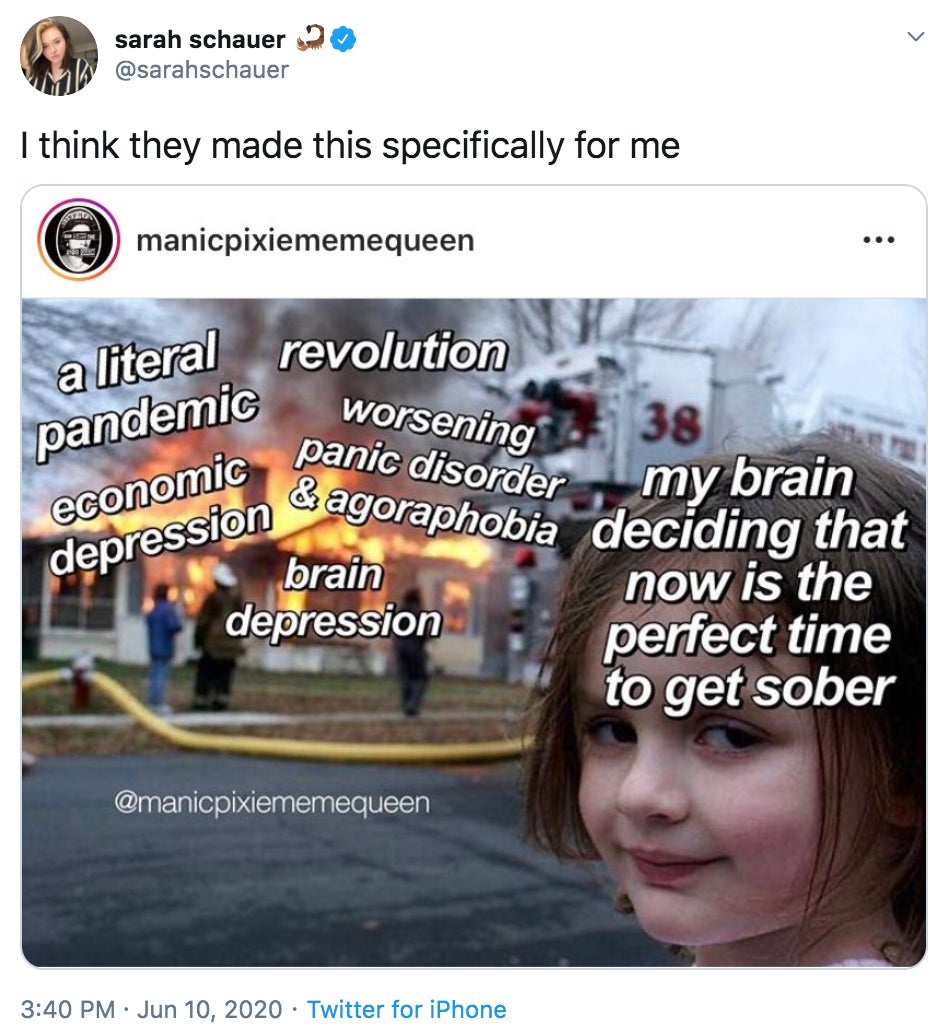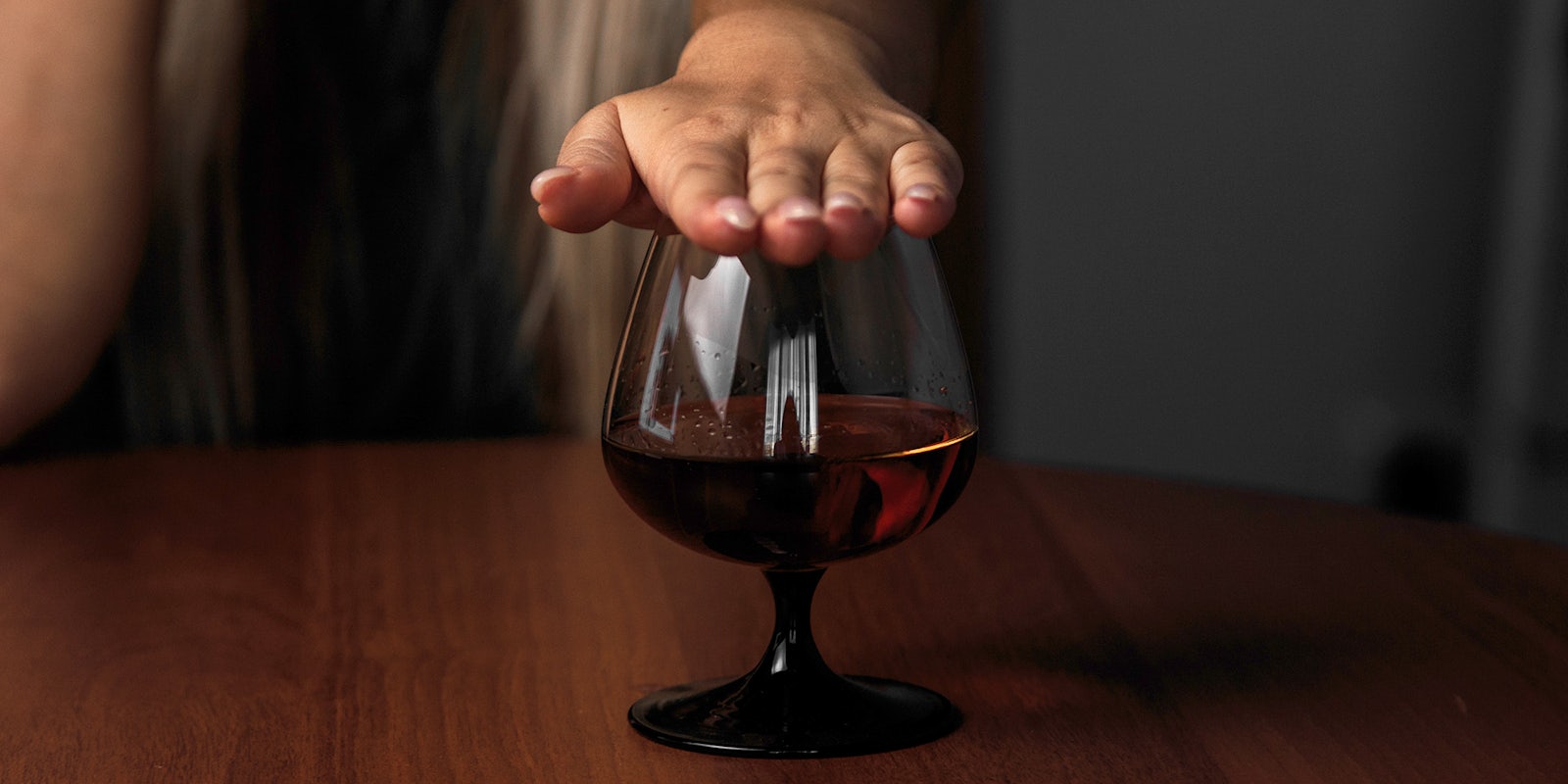This article is the first of four in the Daily Dot’s series on the future of booze and how Americans’ relationship to alcohol is shifting amid the coronavirus pandemic.
Sarah Schauer is almost sure she’s chosen the worst time to get sober.
At the beginning of quarantine, Schauer, 25, said in a video she promised herself that she wouldn’t drink alcohol until restrictions related to the novel coronavirus were lifted. Then, the ex-Viner, who recently surpassed a million followers on TikTok, said she drank every night for two weeks.
“The only person you can trust is yourself, that’s bullshit,” Schauer joked in the TikTok posted on April 2. “I’m a fucking liar, I don’t trust me.”

A little over a week later, she tweeted that she was struggling to control her alcohol intake and asked her followers for help. Then, she decided to stop drinking until the end of quarantine.
“I gotta be honest, it’s just like Madonna said ‘time goes by so slowly.’ But I also don’t want to wish my life away, ya know?” Schauer tweeted on April 14. “I’m eating a popsicle.”
Now, Schauer posts regular updates about her sobriety—filled with jokes, of course—on Twitter and TikTok.

Schauer, who didn’t respond to the Daily Dot’s multiple requests for comments, isn’t alone in reporting increased alcohol consumption or in seeking help. As states shut down bars and restaurants due to coronavirus, many changed laws to expand alcohol delivery options and saw an overall increase in off-premise alcohol sales in line with increases of other non-perishable goods.
According to the National Institute on Alcohol Abuse and Alcoholism, over 14 million U.S. adults had Alcohol Use Disorder in 2018. Stress and isolation, both common during quarantine, are factors that can increase substance abuse.
One U.K. charity told the BBC in April that “the number of people visiting their website for help was up nearly 400% in the past month, compared to the same period last year.”
Dayry Hulkow, a therapist at a Behavioral Health Group facility in Florida, has seen increased relapses first-hand at the facility due to isolation and rising unemployment numbers amid the coronavirus pandemic, according to ABC. Hulkow did not respond to the Daily Dot’s request for comment.
“Also there is the boredom, having to stay at home with very limited access to the outside world, hobbies meetings and employment. All that kind of stuff, it’s a significant trigger as well,” Hulkow told ABC news. “Being confined in such a small area without any outside release could also be a trigger for relapse.”
A man who is 16 years sober also expressed concerns about staying home in a Houston Chronicle article from late April. Before Alcoholics Anonymous (AA) meetings moved online, he said the lack of contact and increased isolation was tough. Then, though he wasn’t drinking, a bout of depression made it harder to attend the online meetings.
Anna, a member of AA who asked not to use her real name as a part of the organization’s ongoing agreement with the press, told the Daily Dot she has been sober and involved with AA since 2004.
Attending meetings is helpful, she said, but quarantine or not, they aren’t what keep people sober.
“What keeps me sober is that I’ve worked the 12 steps of Alcoholics Anonymous and then I continue to work those as needed in my daily life,” Anna told the Daily Dot. “The whole purpose of Alcoholics Anonymous and the 12 steps is to get you sober, but it’s also to get you in touch with a higher power. You still need the contacts with other alcoholics and sometimes that’s what happens in a meeting.”
Anna also said though the online meetings may make it impossible to physically comfort someone, they do make it easier to connect with alcoholics across the nation, and safety behind a screen may make it easier for newcomers to attend.
“I also talked to some other friends of mine last night … and they know of several people that have come into Alcoholics Anonymous through virtual meetings, and they stayed sober for several months, and they’ve never even been to an in-person meeting,” Anna said.
AA isn’t the only virtual resource to help people get or stay sober. Multiple apps that include sobriety counters, motivational notifications, and goal-setting capabilities are available for download.
One app called Loosid aims to provide activities for adults that aren’t centered around drinking and give them resources to stay sober. The app soft launched in November 2018 and added many features in February of this year, right before coronavirus cases began increasing across the nation.
Co-Founder and CEO M.J. Gottlieb, 49, said over 75,000 people have installed the app and usage, specifically in areas concerning mindfulness and gratitude, has increased during quarantine.
“The most important thing is this connection and engagement that happens 24/7,” Gottlieb said. “The opposite of addiction is connection. So it’s all about connection and engagement.”
Schauer’s own solution to help suppress cravings while in quarantine came from the recommendation of fans: drink Sparkling Ice. Though she hasn’t been public about any other steps she may be taking, she has tweeted her fears of being unable to stay sober post quarantine.
“what I’m worried about is that I’ve got my drinking under control in quarantine but I worry about when things open back up, will I start drinking in excess again?” she tweeted on June 30. “then I remember, America won’t reach that point for a while, so I’m probably fine.”


